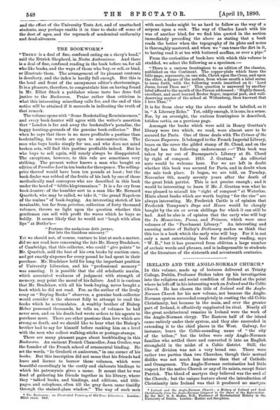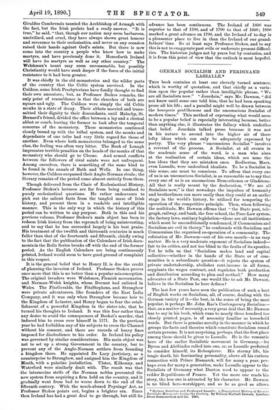IRELAND AND THE ANGLO-NORMAN CHURCH.* IN this volume, made up
of lectures delivered at Trinity College, Dublin, Professor Stokes takes up his investigation into the religious and social condition of Ireland at the point where he left off in his interesting work on Ireland and the Celtic Church. He has chosen the title of Ireland and the Anglo- Norman Church for his new volume, not because the Anglo- Norman system succeeded completely in ousting the old Celtic Christianity, but because in the main, and over the greater part of Ireland, it effectively supplanted its rival. Nearly all the great architectural remains in Ireland were the work of the Anglo-Norman clergy. The Eastern half of the island came entirely under their system, and they also succeeded in extending it to the chief places in the West. Galway, for instance, bears the Celtic-sounding name of "the city of the tribes ;" but the tribes were only Anglo-Norman families who settled there and converted it into an English stronghold in the midst of a Celtic district. Still, the line of division was not a very broad one. There were rather two parties than two Churches, though their mutual dislike was not much less intense than that of Catholic and Orangemen. The Anglo-Norman ecclesiastics had little respect for the native Church or any of its saints, except Saint Patrick. The blood of martyrs they believed was the seed of the Church; but the unique feature about the introduction of Christianity into Ireland was that it produced no martyrs.
* Ireland and the Anglo-Norman Church a History of Ireland and Irish Christianity from the Anglo-Norman Conquest to the Dawn of the Reformation By the Rev. G. S. Stokes, D.D., Professor of Ecclesiastical History in the University of Dublin. London: Hodder and Stoughton.
Ginildus Cambrensis taunted the Archbishop of Armagh with the fact, but the Irish prelate had a ready answer. ”*It is true," he said, "that, though our nation may seem barbarous, uncivilised, and cruel, they have always shown great honour and reverence to their ecclealastics, and never on any occasion raised their hands against God's saints. Bat there is now come into the country a people who know how to make martyrs, and have previously done it. Henceforth Ireland will have its martyrs as well as any other country." The Welshman's taunt may seem unreasonable, but possibly Christianity would have sunk deeper if the force of the initial resistance to it had been greater.
It was chiefly in the old monasteries and the wilder parts of the country that the Celtic system survived. In the Culdees, some Irish Presbyterians have fondly thought to find their own ancestors; but, as Professor Stokes remarks, the only point of resemblance is that the churches of both are square and ugly. The Caldees were simply the old Celtic monks in a state of decay. Their abbots married and trans- mitted their dignity to their descendants, until Malachy, St. Bernard's friend, divided the office between a lay and a clerical abbot or coarb, leaving the former to look after the temporal concerns of the monastery. These monasteries continued closely bound up with the tribal system, and the monks and dependants of one tribe had very little regard for those of another. Even where both monasteries belonged to the same clan, the feeling was often very bitter. The Book of Lenagh imprecates terrible penalties on the heads of the monks of that monastery who should go to Cloone. And armed confficts between the followers of rival saints were not anfrequent. Among ourselves, there is something of the same kind to be found in the annals of Bath and Wells. In one thing, however, the Culdees surpassed their Anglo-Norman rivals ; the literary remains of the period come almost entirely from them.
Though delivered from the Chair of Ecclesiastical History, Professor Stokes's lectures are far from being confined to purely ecclesiastical questions. He rather endeavours to pick out the salient facts from the tangled maze of Irish history, and present them in a readable and intelligible manner. This is the only way in which the history of this period can be written to any purpose. Both in this and his previous volume, Professor Stokes's main object has been to redeem Irish history from the reproach of being uninteresting, and to say that he has succeeded largely is his best praise. His treatment of the twelfth and thirteenth centuries is much fuller than that of the fourteenth and fifteenth, chiefly owing to the fact that the publication of the Calendars of Irish docu- ments in the Rolls Series breaks off with the end of the former period. As the English Calendars are being continuously printed, Ireland would seem to have good ground of complaint in this respect.
It is the general belief that to Henry II. is due the credit of planning the invasion of Ireland. Professor Stokes proves once more that this is no better than a popular misconception. The original invaders were Welshmen, Flemish mercenaries, and Norman-Welsh knights, whom Dermot had enlisted in Wales. The FitzGeralds, the FitzStephens, and Strongbow were private adventurers, like founders of the East India Company, and it was only when Strongbow became heir to the Kingdom of Leinster, and Henry began to fear the estab- lishment of a powerful Kingdom in the sister-isle, that he turned his thoughts to Ireland. It was this fear rather than any desire to avoid the consequences of Becket's murder, that induced him to cross over himself in 71. In the previous year he had forbidden any of his subjects to cross the Channel without his consent, and there are records of heavy fines imposed for disobedience to his order. In Ireland his policy was governed by similar considerations. His main object was not to set up a strong Government in the country, but to prevent any of the Anglo-Norman settlers from founding a kingdom there. He appointed De Lacy justiciary, as a counterpoise to Strongbow, and assigned him the Kingdom of Meath, with a palatine jurisdiction. Ulster, Kilkenny, and Waterford were similarly dealt with. The result was that the internecine strife of the Norman nobles prevented the new system from acquiring a firm hold on the country, and it gradually went from bad to worse down to the end of the fifteenth century. With the much-abused Poynings' Act, as Professor Stokes points out, begins a brighter era. Since then Ireland has had a great deal to go through, but still its advance has been continuous. The Ireland of 1600 was superior to that of 1500, and of 1700 to that of 1600; 1800 marked a great advance on 1700, and the Ireland of to-day is a pleasanter place to live in than the Ireland of our grand- fathers' time. So at least says Professor Stokes, and to say this is not to exaggerate past evils or underrate present difficul- ties. The historian judges not by years but by centuries, and it is from this point of view that the outlook is most hopeful.



















































 Previous page
Previous page